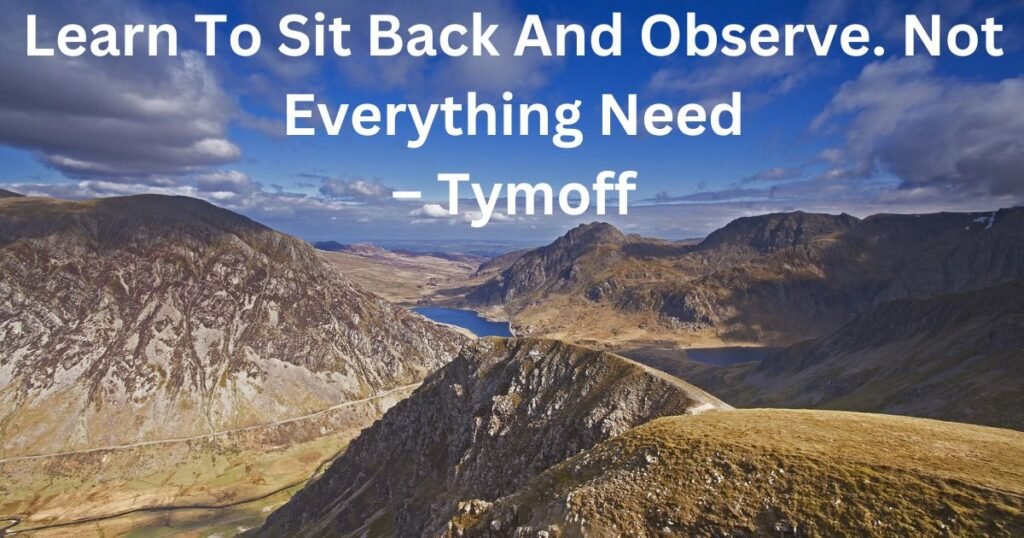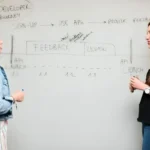Table of Contents
Introduction: learn to sit back and observe. not everything need – tymoff
In a world that is by all accounts continuously yelling, hurrying, and responding, there’s a calm power that frequently slips through the cracks. It’s the force of sitting back, watching, and tuning in prior to acting quickly. Envision you’re in a recreation area, watching the leaves stir in the breeze, individuals strolling their canines, and youngsters playing. This straightforward demonstration of noticing can show us a ton, about our general surroundings as well as about ourselves. learn to sit back and observe. not everything need – tymoff, not all things need a response, is an important expertise that can carry harmony to our bustling lives. Like having a mystery device assists us with understanding when to step in and when to allow things to unfurl normally. We should plunge further into this thought and find how it can make our lives more extravagant and more significant.
The Philosophy Behind “Learn to Sit Back and Observe”
Pausing for a minute to simply watch and tune in prior to responding to something isn’t new. It’s an insight tracked down in many societies and ways of thinking since forever ago. Consider it the quiet eye in a tempest. learn to sit back and observe. not everything need – tymoff around it is turmoil, yet the eye stays tranquil and immaculate. This way of thinking instructs us that only one out of every odd activity needs a prompt reaction. Once in a while, the best reaction is to notice and reflect.
This mentality can be an amazing asset in our quick moving world. It permits us to see things all the more plainly and pursue better choices. At the point when we hurry to respond, we could miss significant subtleties or follow up without really thinking, which can prompt mix-ups. Yet, when we make a stride back, we allow ourselves the opportunity to see the master plan. It’s like checking an embroidery out. Very close, you can see a little piece of the plan, yet when you step back, the whole picture materializes. This point of view can help us in all parts of our lives, from settling on private choices to understanding others better.
The Science of Observation: How It Affects Our Brains
You could ponder, “Is there more to this than simply a way of thinking? Does it really change something in our minds?” The response is yes. At the point when we center around noticing as opposed to responding, it can emphatically affect our emotional wellness. It’s a piece like preparation a muscle. The more we use it, the more grounded it gets.
Researchers have found that practices like care and reflection, which include noticing our contemplations and sentiments without judgment, can lessen pressure, tension, and even work on our mind-set. These exercises can in a real sense change the construction of our mind, reinforcing regions that control consideration and feeling guideline. It’s entrancing to imagine that essentially by changing how we answer the world, we can change our minds such that encourages us.
Practical Ways to Cultivate Observation in Daily Life
All in all, how would we begin integrating this training into our day to day existences? The following are a couple of thoughts:
- Require a couple of moments every day to simply sit and see what’s going on around you. It very well may be in a recreation area, your lawn, or even through of a window. Attempt to do this with practically no interruptions like your telephone.
- Practice careful eating. Focus on the flavors, surfaces, and impressions of what you eat. It’s a basic method for bringing perception into something you do consistently.
- Listen more in discussions. Rather than pondering what you will say straightaway, center around sincerely hearing what the other individual is talking about.
These little advances can be the beginning of a greater change by they way we communicate with our general surroundings.
Observation vs. Reaction: Finding the Balance
Tracking down the right harmony among noticing and responding is critical to outfitting the genuine worth of this way of thinking. There’s actually no need to focus on never responding or being latent throughout everyday life. All things being equal, it’s tied in with knowing when to respite and when to act. Consider it being the overseer of your own film. Some of the time, you really want to allow the scene to work out to comprehend the story better, and different times, you want to step in and direct the activity.
For example, in a warmed conversation, hopping in with a fast reaction could heighten what is happening. However, pausing for a minute to notice the feelings and words being communicated can give you bits of knowledge into the most ideal way to answer. It’s tied in with picking your activities with expectation, as opposed to without much forethought or drive.
This doesn’t mean you’ll continuously take care of business. Life is erratic, and we as a whole are advancing as we go. The significant part is to continue to rehearse, to ponder your encounters, and to change your methodology as you realize what turns out best for you.
The Role of Observation in Personal Growth
Perception can be an integral asset for self-awareness. By carving out opportunity to notice, we become more mindful of our viewpoints, sentiments, and responses. This mindfulness is the most important move towards self-improvement. It permits us to see where we may be trapped in designs that don’t work well for us and gives us the understanding we really want to make changes.
Additionally, perception can work on our associations with others. By noticing more and responding less, we can comprehend individuals around us better. We begin to see things according to their point of view, which can prompt more sympathy and more grounded associations. It resembles being a criminal investigator in your own life, gathering signs that assist you with understanding the higher perspective all the more plainly.
Challenges and Misconceptions About Observing Without Reacting
Embracing a more perceptive position in life isn’t without its difficulties. One normal confusion is that perception is a type of inactivity or lack of concern. In any case, this couldn’t possibly be more off-base. Perception requires dynamic commitment with the current second. It’s a cognizant decision to keep down quick judgment or response to see all the more profoundly.
Another test is the strain to constantly be accomplishing something in the present efficiency centered culture. Carving out opportunity to simply notice can in some cases be viewed as an extravagance or an exercise in futility. Yet, the advantages of perception for our psychological well-being and self-awareness clarify that this time isn’t squandered — it’s put resources into understanding ourselves and our general surroundings better.
Conclusion
Embracing the act of pausing for a minute or two and noticing can change the manner in which we collaborate with the world. There’s really no need to focus on pulling out from life, yet captivating with it all the more completely, with goal and mindfulness. Like any ability, it takes practice, and there will be minutes when we fall once again into old propensities for responding excessively fast. In any case, with time, tolerance, and constancy, perception can turn into a characteristic piece of how we explore life.
Read More: TEX9.NET GAMING







